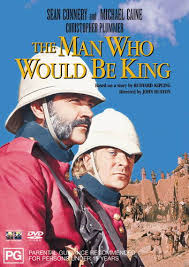Search
Freemasonry on Film

Freemasonry has appeared both accurately and fictitiously in film since the early days of the genre.
Freemasons have played their part in the development of the Movie industry. Louis B. Mayer and the Warner Brothers helped to establish the industry. Actors such as Clark Gable and John Wayne worked in front of the cameras delighting fans the world over.
Freemasonry as an organization, depending on the film, has been treated harshly, fairly, accurately and inaccurately. Much of this is made easier by the perceived nature of our "secret society". In fact it is such a secret society every day more and more websites like this one pop up all across the Internet to inform members and non-members about the inner workings of our organization.
There are far too many movies to list which mention Freemasonry, casting us as the heroes or villains. Instead I am going to tell you about three of my personal favorites.
Let's start with the easy one, National Treasure released in 2004. The movie actually played on the connection made by Andrew Michael Ramsay when he made a veiled connection between the Knights Templar and Freemasonry. In the film, Freemasons receive from the Knights Templar, after they are arrested by the King France (a real event), the treasure the Knights Templar are thought to have uncovered on the temple mount when they controled Jerusalem (a partially real event). The treasure is hidden on American soil and the founding fathers, some of whom were mason (not as many as Freemasons like to believe), left clues on the Declaration of Independence and other prominent landmarks associated with the founding of the country. Like most films involving Freemasonry it has it's parts where a mason will say "yeah, kind of." Still if you are looking for a fun movie for a lodge movie night, it is a good way to go.
The next is From Hell. The story follows a detective assigned the Jack the Ripper case in 19th century London. As he pursues the killer he discovers a conspiracy and Freemasonry is at its center. In the film, the main character has to deal with the Commissioner of Police Sir Charles Warren a real individual and mason who was the first Worshipful Master of Quatuor Coronati Lodge. As the movie progresses, the involvement of the Freemasons becomes more apparent and includes a scene toward the end which is now infamous in Masonic lore. It is the moment when writing is found on a wall, allegedly written by Jack the Ripper blaming the the "Jues" fault. Some have connected the word "Jues" to the three villains in Masonic ritual. The moment in the film is historically accurate when Warren who orders the writing removed. The real Warren later indicated he did it because, despite the misspelling of the word Jews, he feared attacks on the Jewish community. This is another good movie for a masonic movie night. A warning it is rather graphic.
The final film is, in my opinion, the best film for any Freemason to see. The Man Who Would Be King is based on the short story (you can read it here) by Rudyard Kipling. In the movie Kipling encounters a man who steals his pocket watch and quickly returns it to him when he realizes he has stolen from a brother mason. The story follows the man who Kipling encounters and his friend as they make their way into a country bordering on India and try to make their fortune. Along the way a series of misunderstandings and the discovery of a city founded by Alexander the Great, who in the film is claimed to be a mason, the two men rise to power only to have their deceptions revealed and punished. There is probably no other film out there with such a strong masonic overtone. Not to mention the movie is fun with many funny parts between the two stars Michael Caine and Sean Connery (to my knowledge neither are masons).
This article provided by Brother Eric C. Steele.